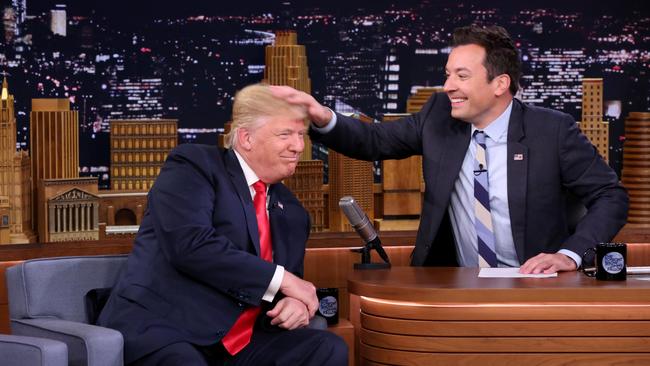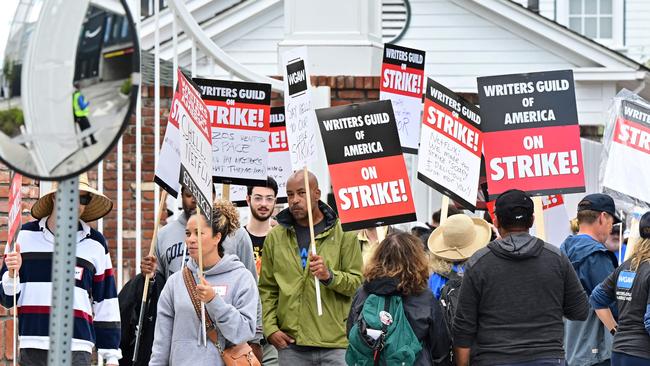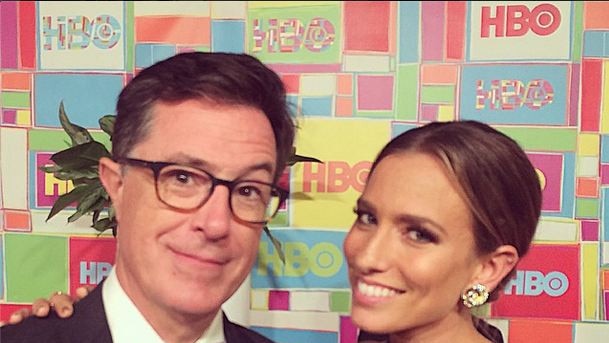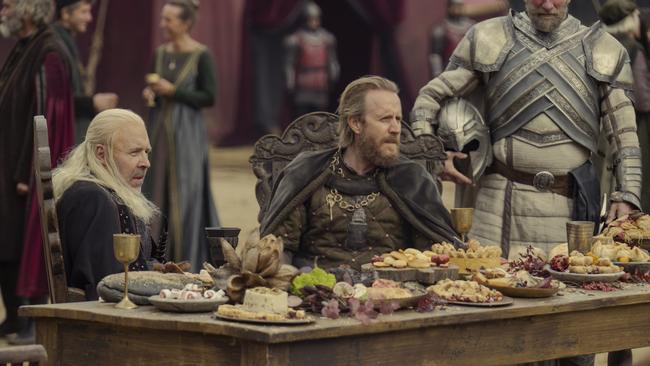Lost for words, US talk shows face uncertain future
Writers going on strike could deal a fatal blow to what used to be must-see nightly viewing.

For 70 years Americans have stayed up in their millions for late-night talk shows, burning the midnight oil to see Hollywood actors and even presidents sitting down for a breezy chat with a wisecracking host.
Johnny Carson was master of the form for a 30-year stretch as presenter of The Tonight Show from 1962, before David Letterman and Jay Leno took over in the 1990s, attracting huge audiences with easy charm, comedy sketches and guest musicians.
The era of late-night talk shows may be about to end, however, as the Hollywood writers’ strike threatens to hammer the final nail into the coffin of a format already struggling with dwindling viewer numbers.
The big three chat shows – now hosted by Jimmy Fallon, Jimmy Kimmel and Stephen Colbert – have been taken off the air thanks to the walkout, and their networks have broadcast repeats instead. The talk show presented by James Corden, who quit last week after eight years at CBS, has been replaced by game shows.
Commentators believe that, in the event of a prolonged strike, what remains of the programs’ audiences may lose interest, and the late-night talk show could be consigned to history.
Bill Carter, a veteran journalist and author of the book The Late Shift: Letterman, Leno, and the Network Battle for the Night, said the format was under “serious threat”. He noted that during a writers’ strike in 2007, which lasted 100 days, late-night was considered to be in danger, although it was in far better shape than it is today.
“They’re already diminished,” he said. “And the idea that they could basically go away for three months or something – it might just burn up whatever’s left of the audience that wants to see them.”
Stephen Galloway, the former executive editor of the Hollywood Reporter and the dean of Chapman University’s film school, said: “This is a tipping point for late-night, which has been struggling … people used to talk about Johnny Carson and ask if I watched his show. No one ever says to me any more, ‘did you watch Stephen Colbert last night (Thursday)? Or Jimmy Kimmel?’”

Late-night shows are expensive to produce and a lengthy spell off the air may have executives pondering whether they offer value for money in the streaming age. Kimmel is reported to earn $US15 million ($22.5m) a year for hosting Jimmy Kimmel Live! and Fallon and Colbert will make similar salaries for The Tonight Show and The Late Show.
All three programs employ sizeable writing teams, adding to the cost and leaving executives with no option but to go dark during the strike by the Writers Guild of America. The union ordered a walkout in a row with studios over pay.
Viewing figures suggest that the shows will not be greatly missed. Colbert attracted an average of 2.1 million viewers last year, according to Fox News, and Fallon averaged 1.4 million, slightly below Kimmel’s 1.5 million. In 2006 Leno had a nightly average of 5.7 million viewers for The Tonight Show.

Late-night is not alone in feeling the effects of the writers’ strike, and Hollywood is braced for turbulence until the dispute is resolved.
The walkout began on Tuesday after the guild said that the Alliance of Motion Picture and Television Producers, which represents the likes of Netflix, Warner Bros and Disney, had failed to make an acceptable offer. Writers argue that the industry’s shift to streaming has deprived them of residual payments, and the “mini-rooms” increasingly employed by studios mean that there is less work.
So far production companies have been bullish. The Game of Thrones spin-off House of the Dragon will continue filming in the UK, and a source told Variety that the scripts had been completed for some time and production should not be affected.

However, there is some scepticism over that claim. Shows usually require rewrites mid-production, a practice that will be forbidden while the strike continues.
During the 100-day walkout of 2007, viewers reported a noticeable drop in quality on some of their favourite shows, including Heroes and Friday Night Lights.
This time, Galloway said, it will take months before viewers notice a difference because studios have stockpiled scripts and have a bank of content to rely on. He also does not believe the strike will result in a surge in the popularity of reality TV, as happened in 2007.
“I don’t think we’re going to see that explosion for reality TV because it kind of peaked and you still need good ideas,” he said.
“A lot will depend on how long the strike is. If the strike is a week it will hardly have any impact, if it’s a month it’ll have a bit – but if it’s six months, or a year, it’ll have a really, really devastating impact.”
Watercooler moments
David Letterman exposes blackmail plot
During a 2009 taping of The Late Show, Letterman revealed he was being blackmailed over sexual relationships with staff, and had handed over a fake cheque for $US2m. A producer later pleaded guilty to extortion.
Jay Leno quizzes Hugh Grant over prostitute
The actor was arrested – along with the sex worker Divine Brown – in 1995, two weeks before his scheduled appearance on The Tonight Show. Many were surprised that he kept his appointment. Leno’s questions included: “What the hell were you thinking?”
Jimmy Fallon ruffles Donald Trump’s hair
Seeking a light-hearted moment amid the political division of 2016, Fallon tousled the hair of the Republican nominee for president, prompting outrage from some quarters. Fallon later said the row left him depressed.
The Terminator reveals his political ambition
In 2003, Arnold Schwarzenegger told Leno he was running for governor of California. Rapturous applause followed – as did electoral success.
The Times



To join the conversation, please log in. Don't have an account? Register
Join the conversation, you are commenting as Logout